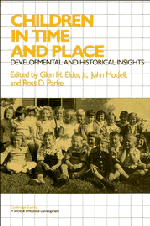Book contents
- Frontmatter
- Contents
- Preface
- Acknowledgments
- List of contributors
- Part I A proposal
- Part II Historical and life transitions
- Part III Life transitions across historical time
- Part IV The cross-disciplinary collaboration
- 8 The workshop enterprise
- 9 The elusive historical child: Ways of knowing the child of history and psychology
- 10 A paradigm in question: Commentary
- 11 Epilogue: An emerging framework for dialogue between history and developmental psychology
- Bibliography
- Author index
- Subject index
10 - A paradigm in question: Commentary
Published online by Cambridge University Press: 03 May 2011
- Frontmatter
- Contents
- Preface
- Acknowledgments
- List of contributors
- Part I A proposal
- Part II Historical and life transitions
- Part III Life transitions across historical time
- Part IV The cross-disciplinary collaboration
- 8 The workshop enterprise
- 9 The elusive historical child: Ways of knowing the child of history and psychology
- 10 A paradigm in question: Commentary
- 11 Epilogue: An emerging framework for dialogue between history and developmental psychology
- Bibliography
- Author index
- Subject index
Summary
Here were the developmentalists, dealing with the universals of human development and human nature. What was their place in a discussion of trends and historical changes and shifting norms?
Sheldon White (1984)The closing moments of the Belmont Conference provided a chance to reflect on our cross-disciplinary efforts and to question the practicality of inquiry informed by the knowledge base of only a single discipline on child development. What is the historical challenge to the study of child development?
Consider the following “what if” speculation. What if the terms in which children are described at particular chronological ages have changed over time as well as the processes that govern their movement into adulthood? What does this say about how child development should be pursued in the present? The probing commentaries on the Belmont workshop by the developmentalist William Kessen and the social historian Michael Zuckerman have much in common with these considerations.
Each analyst praises the participants for having explored at least a promontory of fresh intellectual ground, and each calls for efforts that move one level deeper. Kessen suggests that a more solid interpenetration of the two disciplines may be achieved through the pursuit of evidential issues and, perhaps, by form of argument, a step taken in part by Emily Cahan and her collaborators in chapter 9. Zuckerman seeks a more thoroughgoing collaboration across disciplines, requiring different research questions.
- Type
- Chapter
- Information
- Children in Time and PlaceDevelopmental and Historical Insights, pp. 224 - 240Publisher: Cambridge University PressPrint publication year: 1993

